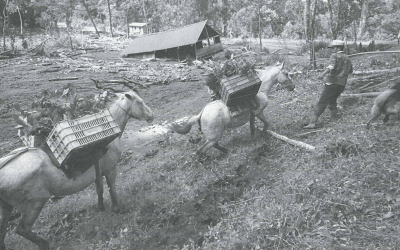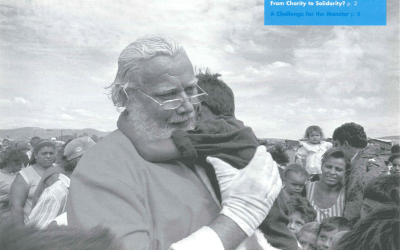Social Enterprise Knowledge Network
When you think of how to improve the lives of the poor in Latin America, you might first think of food, education, and health. However, one of the most pressing needs–even if not as obvious–is to teach leaders of non-governmental organizations (NGOs) how to be more effective managers. After all, those leaders are the movers and shakers for socioeconomic change and betterment.
Business leaders also urgently need an enriched management education to increase their interest and capacity to engage effectively in the social sector, thus fostering sustainable development. Societies will achieve meaningful progress only when there is a dynamic and responsible business sector and a vigorous and capable civil society. Furthermore, development possibilities are even greater if these two sectors are able to join forces in collaborative undertakings. Adding the public sector into the collaboration equation can often increase the potential good still further.
The Social Enterprise Knowledge Network (SEKN), a collaboration formed last year to address this need for generating intellectual capital developed in the region itself, came about through the participation of a group of leading Latin American business schools and the Harvard Business School in partnership with the AVINA Foundation.
THE MISSION
The Social Enterprise Knowledge Network (SEKN) seeks:
To advance the frontiers of knowledge and practice in social enterprise through collaborative research, shared learning, case-based teaching, and the strengthening of management education institutions’ capabilities to serve their communities.
Social Enterprise is defined as organizations or undertakings with an embedded social purpose. This encompasses NGOs or private or public sector businesses engaged in activities or producing goods or services of significant social value. The underlying social purpose of the enterprise, rather than its particular legal form, determines whether it falls into this category or not. SEKN prioritizes the generation of knowledge about social enterprise, but the Network’s purpose is also to convert that new knowledge into training that will improve management practice in social enterprises. That process occurs by increasing the capacity of educational institutions to carry out research and to implement teaching programs for their degree program students, as well as for the continuing education of practicing managers. SEKN has two particularly distinctive characteristics. First, it emphasizes inter-institutional collaboration. It is based on the premise that there is great power in carrying out closely coordinated research and in engaging in lateral learning. Second, the research has a field-based orientation and the teaching has a strong focus on case studies and discussion-based learning.
THE FOUNDING INSTITUTIONS
SEKN founders include the following management education institutions:
- Harvard Business School, U.S.A.
- Instituto Centroamericano de Administración de Empresa (INCAE), Costa Rica
- Instituto Tecnológico y de Estudios Superiores de Monterrey- Escuela de Graduados en Administración y Dirección de Empresas (EGADE) , Mexico
- Pontificia Universidad Católica de Chile
- Universidad de Los Andes, Colombia
- Universidad de San Andrés – Universidad Torcuato Di Tella CEDES, Argentina
- Universidade do Sao Paulo, Brasil
Each of the members of SEKN considers social enterprise as central to its mission and has made a major institutional commitment to developing social enterprise research and courses as an integral part of their educational programs. Other schools will be invited into the Network at the beginning of each two-year research cycle.
RESEARCH FOCUS
SEKN researches high priority areas in the Social Enterprise field in several different countries. Members collectively select a single research topic, design a set of common research questions, and then engage in field-based research. The research in each country examines in depth four or more situations of social enterprise practice in the chosen topic area. These case analyses result in a paper for each country drawing the experiences together and reaching conclusions related to the specified research questions. In turn, these country-specific papers provide the basis for cross-country comparative analyses to identify commonalties and differences on the phenomenon being studied.
The research topic for the 2001-2003 research cycle is on collaborations between businesses and NGOs. As one of the principal theoretical and empirical reference points, this research is using the findings and constructs from research on such cross-sector alliances in the USA (James E. Austin, The Collaboration Challenge: How Nonprofits and Businesses Succeed Through Strategic Alliances, San Francisco: Jossey-Bass Publishers, 2000).
The case studies in each of the countries identify the motivations for these alliances and analyze the key factors shaping their evolution and effectiveness. The cross-country comparisons aim to identify commonalties and differences among the Latin American countries and with the United States.
These analytical cases will be also used to create teaching cases for Social Enterprise courses being developed by each school. Each institution’s cases will be available for use in the other schools, thereby accelerating the development of sufficient materials to mount courses. The cases will also be accessible to institutions outside of the Social Enterprise Knowledge Network through the case distribution publishing system of the Harvard Business School.
To illustrate the types of Latin American cross-sector collaborations between NGOs and businesses currently being researched, we offer the following examples from the SEKN institutions:
- Argentina – Universidad de San Andrés – Universidad Torcuato Di Tella CEDES
La Nación, the second largest circulation and one of the most influential newspapers in Argentina, started a few years ago to include articles about the social sector and to cover innovations from community based organizations in dealing with pressing social needs. In this process La Nación journalists and management have worked with Red Solidaria, a grassroots group that emerged in 1995 with the mission of spreading the culture of solidarity in Argentina society by connecting those who experience a need with those who can help. Through this relationship, they have identified cases and examples to report in the newspaper, have developed sections for the newspaper and the weekly magazine, and since September, 2000, have launched Clasificados Solidarios, at least a half page of free classified advertising daily for nonprofits to advertise their needs for goods and services. Volunteers can also take advantage of the free ads to offer services to nonprofits. This joint project has proven to be a very powerful tool to connect donors and social sector organizations.
- Brasil Universidade do Sao Paulo
Banco Itaú, founded in 1945, is the second largest private bank in Brasil. As part of its social responsibility strategy it created a Community Assistance Program aimed at projects in education and health. To carry out this program, the Bank established cross-sector alliances with partners selected for their technical expertise to operate these programs and to establish relations with the communities. Education and Participation, one of the two programs, helped civil society organizations to assist needy students with supplementary schooling programs. Itaú’s partners included the Ministry of Education, UNICEF, Unilever Company affiliates, Universidade do Sao Paulo, and CENPEC, a nonprofit organization dedicated to research and strengthening public education. CENPEC provides technical direction and establishes contacts with community organizations. The Program includes the Itaú Prize in Education and Participation and constitutes one of the most competitive selection processes in Brasil’s Third Sector.
- Central America Instituto Centroamericano de Administración de Empresas (INCAE)
The Instituto Nicaragüense de Desarrollo facilitated the development in 1991 of the Young Nicaraguan Entrepreneurs program, an affiliate of Junior Achievement International (JAI). This program focused on at-risk youth rather than the more typical target group of university students. The traditional training materials were redesigned for this new group of youths with the assistance of UNICEF. This effort earned the program the JAI prize for innovation in adapting educational materials. As a result of the program, UNICEF has made basic changes in its assistance to these types of programs. Pizza Hut, Texaco, and other companies are involved by providing its executives as teachers in the program.
- Chile – Pontificia Universidad Católica de Chile
Agrícola Ariztía, one of Chile’s leading poultry producers, engaged in a partnership with Corporación Municipal de Melpilla (CMM), a nonprofit entity that managed the public health and education system of this municipality of 100,000 inhabitants south of Santiago. The company viewed the community as one of its central stakeholders. The head of the company played a leadership role on the board of CMM and the company had provided in-kind and financial assistance to create a vocational school within the municipality’s educational system, as well as donations to reward high performing teachers. CMM also provided health services to the company’s employees. The leaders of both the company and the CMM faced succession issues with the corresponding challenges for the continuity of the partnership. (See Diana Barrett’s article in this issue for further observations on this alliance and related commentary on corporate philanthropy).
- Colombia – Universidad de Los Andes
The Lideres Siglo XXI project was born seven years ago from the initiative of a group of business leaders of the Foro de Presidentes of the Cámara de Comercio de Bogotá. Ten companies and private schools found a common goal of improving the quality of education in Colombia. Today, 187 private and public schools have partnered with 109 companies in 9 cities to strengthen their organizations benefiting over 100,000 children. The project helps schools adopt best practices in management and in 2001 they held the First Meeting on Quality of Educational Management to highlight the experience of the schools that had made the most progress. In addition to quality themes, they also have worked on planning and policy implementation.
- Mexico – Escuela de Graduados en Administración y Dirección de Empresas (EGADE)
HEB, a family-owned Texan retailer, is the twelfth largest supermarket chain in the U.S.. In expanding its operations into Mexico in 1997, the company transferred not only its products and services but also its social strategy of working with food banks. El Banco de Alimentos de Monterrey, one of Caritas’ social service programs, began in 1989 with the purpose of providing nutritional assistance to needy families regardless of religious affiliation. The collaboration of HEB with the Monterrey Food Bank enabled this operation to move from a basic to a world class level in terms of new storage and handling facilities and administrative systems. The partners perceived significant benefits for each other and the community. Strong leadership and interpersonal relationships contributed to the development of a considerable mutual trust that has fostered a vigorous and growing partnership.
FUTURE
The Social Enterprise Knowledge Network will hold its first SEKN Research Conference in mid-2003 in which the final results of the first research cycle will be presented and discussed. Plans are to publish an edited volume in English, Spanish, and Portuguese. This will be the first in the SEKN Series, to be followed by subsequent volumes focused on other important topics and carried out in two-year cycles.
Spring 2002, Volume I, Number 3
James E. Austin, a DRCLAS Policy Committee member, is the John G. McLean Professor of Business Administration at Harvard Business School and the cofounder and chair of the Harvard Business School Initiative on Social Enterprise.
Related Articles
Obras de Infraestructura Básica de Fácil Ejecución a través de la Autogestión
En el Ecuador rural y en las zonas citadinas marginales, la carencia de servicios básicos se ha convertido en un mal endémico no resuelto hasta …
Responsabilidad Social Empresarial: Algunos Hechos Que Cuentan
La Responsabilidad Social Corporativa (RSC) es una temática más bien nueva en Chile. Aún cuando se encuentran acciones filantrópicas desde tiempos de la colonia, la relación de la …
Algunos Casos en Chile
Un caso fue José Tomás Urmeneta, un empresario del siglo XIX quien, en un momento de auge del sector agroexportador chileno, en su testamento dejó asignados recursos para …




